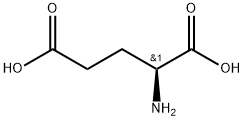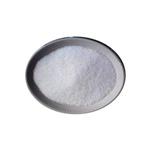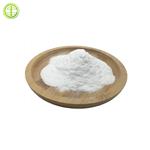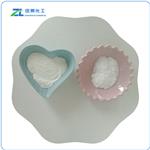
Polyglutamic acid
- Product NamePolyglutamic acid
- CAS25513-46-6
- CBNumberCB2132778
- MFC5H9NO4
- MW147.13
- EINECS200-293-7
- MDL NumberMFCD00148021
- MOL File25513-46-6.mol
Chemical Properties
| storage temp. | −20°C |
| InChI | InChI=1/C5H9NO4/c6-3(5(9)10)1-2-4(7)8/h3H,1-2,6H2,(H,7,8)(H,9,10)/t3-/s3 |
| InChIKey | WHUUTDBJXJRKMK-ZJPLZJKBNA-N |
| SMILES | [C@@H](N)(C(=O)O)CCC(=O)O |&1:0,r| |
Safety
| WGK Germany | 3 |
| RTECS | MA1700000 |
| F | 3-10 |
Polyglutamic acid Price
| Product number | Packaging | Price | Product description | Buy |
|---|---|---|---|---|
| ChemScene CS-0043360 | 10g | $115 | γ-Polyglutamicacidγ-PGA |
Buy |
| ChemScene CS-0043360 | 25g | $230 | γ-Polyglutamicacidγ-PGA |
Buy |
| Labseeker SC-19546 | 100g | $400 | POLY-L-GLUTAMICACID 分子量150万 |
Buy |
Polyglutamic acid Chemical Properties,Usage,Production
Description
Polyglutamic acid (PGA), a poly amino acid produced by Bacillus spp. is a naturally occurring anionic, water-soluble, biodegradable, non-toxic, viscous, edible biopolymer containing D and L-glutamic acid residues with different industrial applications.Uses
Polyglutamic acid is commonly used in cosmetics as a powerful humectant for moisturising the skin. It is ideal for people with dry or dehydrated skin and may help to reduce the appearance of fine lines and wrinkles. Polyglutamic acid is also used in the food industry and has the ability to improve taste and flavour. In addition, Polyglutamic acid is an environmentally friendly biomaterial that can be used as a drug carrier/delivery agent and as a contrast agent.Definition
ChEBI: A macromolecule composed of repeating gamma-linked L-glutamyl units.Preparation
The Preparation method of Polyglutamic acid is as follows:poplar sawdust was used to produce Polyglutamic acid. Poplar sawdust was treated with acid and then hydrolyzed with cellulose. The enzymatic hydrolysate was used to produce Polyglutamic acid. Through single factor and orthogonal experiments, the optimum enzymatic conditions were determined as follows: solid-liquid ratio 1:5, enzyme amount 22 FPU/g, pH 5.0 and 53 min. Under the enzymatic hydrolysate medium, the Polyglutamic acid yield reached 30.87 ± 0.44 g/L, which was 5.11% higher than that in glucose medium (29.37 ± 0.43 g/L). In addition, the amount of glucose added to the medium was reduced, which realized the comprehensive utilization of various sugars in sawdust enzymatic hydrolysate.Application
Polyglutamic acid is considered a promising bio-based chemical and is already widely used in the food, medical, and wastewater industries due to its biodegradable, non-toxic, and non-immunogenic properties.benefits
The primary benefit of polyglutamic acid is its impressive ability to hydrate skin. Because it’s a polymer, it forms a flexible, smooth, moisture-binding film on skin’s surface. This film helps skin keep moisture in its surface layers, even in conditions of low humidity, making polyglutamic acid an effective humectant. In addition to its abilities to aid skin in moisture retention, polyglutamic acid soothes and helps increase the production of natural moisturizing factors (NMF) in skin, which contributes to having a healthier barrier and balanced hydration. Polyglutamic acid hydrates skin but also performs other roles as well including wrinkle reduction, balancing the effects of chronic sun exposure and enhancing wound healing.Side effects
Polyglutamic acid is generally considered safe and allergic reaction side effects are rare, which may result in itching, swelling, redness, burning sensation or blisters. Before applying Polyglutamic acid to your face, you can perform a patch test to ensure that you are tolerating this ingredient well.Toxicology
This substance/mixture contains no components considered to be either persistent, bioaccumulative and toxic (PBT), or very persistent and very bioaccumulative (vPvB) at levels of 0.1% or higherPreparation Products And Raw materials
Polyglutamic acid Supplier
Global(317)Suppliers
| Supplier | Tel | Country | ProdList | Advantage | ||
|---|---|---|---|---|---|---|
| 0592-5800732; +8613806035118 |
xie@china-sinoway.com | China | 988 | 58 | ||
| +8615531157085 | abby@weibangbio.com | China | 8803 | 58 | ||
| +86-66697723 +86-17703311139 |
admin@china-yime.com | China | 563 | 58 | ||
| +86-13131129325 | sales1@chuanghaibio.com | China | 5881 | 58 | ||
| +86-0311-87836622 +86-18712993135 |
sales01@tairunfaz.com | China | 8051 | 58 | ||
| +86-15532196582 +86-15373005021 |
lisa@kingfinertech.com | China | 3007 | 58 | ||
| +86-18565342920; +8618565342920 |
sales@chembj.net | China | 290 | 58 | ||
| +undefined18602966907 | qinhe02@xaltbio.com | China | 997 | 58 | ||
| +86-18400010335 +86-18034520335 |
admin@hbsaisier.cn | China | 1015 | 58 | ||
| +8618629063126 | info@binbobiological.com | China | 435 | 58 |
Related articles
What are the benefits of Polyglutamic acid for the skin?
Polyglutamic acid (PGA) is a synthetic peptide that is water soluble, edible and environmentally friendly. It consists of glutamic acid molecules.
Jun 6,2024
Polyglutamic acid is challenging to synthesize and has diverse applications in food and drug delivery industries due to its unique properties and potential benefits.
Jan 19,2024
The rising star of the beauty industry——Polyglutamic acid
Polyglutamic acid (PGA) is a humectant and powerful hydrator that can attract moisture and seal it in. It is made up of a group of glutamic acid molecules.
Nov 6,2023
25513-46-6, Polyglutamic acidRelated Search
PROMPT×
PROMPT
The What'sApp is temporarily not supported in mainland China
The What'sApp is temporarily not supported in mainland China
Cancel
Determine


